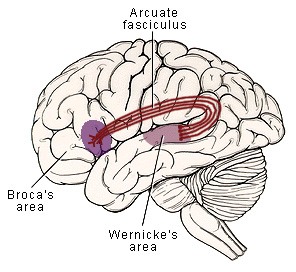Broca's aphasia
From Psy3242
Bchristian (Talk | contribs) (adding links) |
|||
| (One intermediate revision not shown) | |||
| Line 1: | Line 1: | ||
[[Category:Neuropsychological syndromes]] | [[Category:Neuropsychological syndromes]] | ||
| - | Named after [[Paul Broca]] in 1861, Broca's aphasia is a motor speech disorder that results in one's inability to properly pronounce and/or remember words correctly. Such non fluency in the pronunciation of words can result in incoherent responses like "Speech" pronounced as "peech" or "talk" will sound like "palk". This is because letters like p, b, and m are formed at the front of the mouth while s and t are harder to pronounce with motor skills disorders. Also, patients suffering from Broca's | + | Named after [[Paul Broca]] in 1861, Broca's aphasia is a motor speech disorder that results in one's inability to properly pronounce and/or remember words correctly. Such non fluency in the pronunciation of words can result in incoherent responses, like "Speech" pronounced as "peech", or "talk" will sound like "palk". This is because letters like p, b, and m are formed at the front of the mouth, while s and t are harder to pronounce with motor skills disorders. Also, patients suffering from Broca's aphasia tend to use verbs in a more simple form such as "me go" instead of "I am going" (86, Ogden). [[Paul Broca]]'s patient Leborgne, also known as [[Tan (aphasia patient)]], constantly mumbled this word, hence the name. [[Tan (aphasia patient)]] suffered a lesion on the third frontal gyrus. The frontal gyrus, which is known as the Broca's area is in high correlation to the motor-speech memories. Adjacent to the [[Broca's area]], the precentral gyrus features the motor neurons for the tongue and lips. Issues with either/both of these areas easily result with incoherently pronounced words. |
OTHER AREAS OF DIFFICULTY: | OTHER AREAS OF DIFFICULTY: | ||
| Line 11: | Line 11: | ||
[[Image:Brocasaphasia1.jpg]] | [[Image:Brocasaphasia1.jpg]] | ||
| + | |||
| + | [http://www.youtube.com/watch?v=f2IiMEbMnPM Broca's Aphasia Video from Class] | ||
Current revision as of 17:37, 28 April 2008
Named after Paul Broca in 1861, Broca's aphasia is a motor speech disorder that results in one's inability to properly pronounce and/or remember words correctly. Such non fluency in the pronunciation of words can result in incoherent responses, like "Speech" pronounced as "peech", or "talk" will sound like "palk". This is because letters like p, b, and m are formed at the front of the mouth, while s and t are harder to pronounce with motor skills disorders. Also, patients suffering from Broca's aphasia tend to use verbs in a more simple form such as "me go" instead of "I am going" (86, Ogden). Paul Broca's patient Leborgne, also known as Tan (aphasia patient), constantly mumbled this word, hence the name. Tan (aphasia patient) suffered a lesion on the third frontal gyrus. The frontal gyrus, which is known as the Broca's area is in high correlation to the motor-speech memories. Adjacent to the Broca's area, the precentral gyrus features the motor neurons for the tongue and lips. Issues with either/both of these areas easily result with incoherently pronounced words.
OTHER AREAS OF DIFFICULTY:
One's right hand can become paralyzed as the lesion of the brain that relates to the frontal gyrus can invade the motor strip of the hand. This often happens with Broca's patients and such physical disorders leads these Broca's patients to attempt to write with their non paralyzed left hands. Unfortunately, switching hands results in non fluent writing including misspelled words, inaccurate grammar, and words that are left out completely. Ogden states that copying can be the best option for this situation.
Many Broca's patients suffer from oral apraxia, which demonstrates a high correlation between the two. Oral apraxia results in patients having trouble performing learned motor skills on command. Patients who have a severe diagnosis of oral apraxia tend to be unable to imitate the instructor with such tasks as whistling or sticking one's tongue out.
As stated before, the paralysis of the right arm generally goes with the Broca's aphasia. If the patient can improve his/her speech, the paralyzed arm usually can become usable again. However, if the speech does not improve, then generally the paralyzed arm will remain inept to any form of use.

